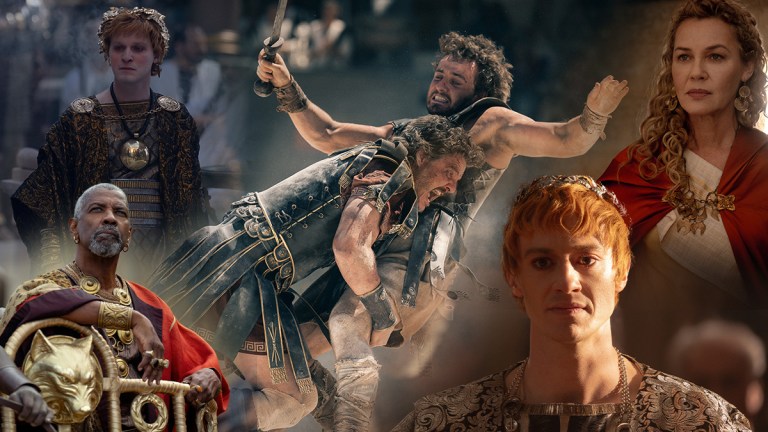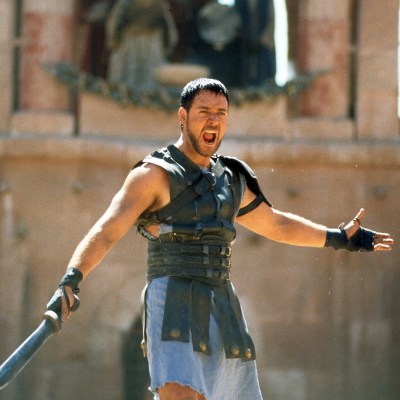Gladiator 2: Ridley Scott Sees Our Future in the Fallen Roman Empire
Exclusive: Ridley Scott, Connie Nielsen, and Fred Hechinger take us inside Gladiator II, an Ancient Rome spectacle like no other—and one that holds up a mirror to right now.

This article appears in the new issue of DEN OF GEEK magazine. You can read all of our magazine stories here.
History tells us that for a brief period circa 209-211 A.D., twin brothers named Caracalla and Geta ruled the Roman Empire as co-emperors at the behest of their late father (and previous emperor) Septimius Severus. The brothers’ shared stewardship of their kingdom did not end well, nor was it a particularly illustrious time for the empire itself.
But it has, more than 18 centuries later, provided us with one positive aftermath: it forms much of the basis of Gladiator II, the long-awaited sequel to director Ridley Scott’s Oscar-winning 2000 film Gladiator, in which Russell Crowe was indelible as a Roman general seeking vengeance after he is betrayed and left for dead by the cruel, unstable Emperor Commodus (Joaquin Phoenix). Scott’s old-fashioned period spectacle earned $465 million at the box office and took home five Oscars, including Best Picture and Best Actor, while cementing Scott’s reputation as a master of the historical epic.
Although Crowe’s Maximus departed this life at the end of Gladiator, along with his nemesis Commodus, discussions about a sequel began way back in 2001, shortly after the first film ended its run. While various pitches were thrown around (including one idea in which Maximus comes back from the Roman conception of the afterlife), development of a follow-up stalled until around 2017. That’s when Paramount Pictures, which had obtained the rights, decided it was time to return to the arena.
According to Ridley Scott, work on the sequel’s script began four years ago, and part of the premise for the sequel revolved around Caracalla and Geta. “After [Commodus’] death, there was a scramble for the chair, and out of that eventually came a man who became the father of the two princes,” Scott explains. “He, as emperors go, was semi-decent—sometimes weak, sometimes lax, but not terrible. But when he died of, I think, natural causes at 70, which was old for the Roman Empire, the two brothers took over. One of them was just this side of being dysfunctional, a lunatic. The other one tried to control his brother. So that state of constant disagreement and fluctuating personalities was where we began.”
Brothers in Harm
The two brothers are played by Fred Hechinger (Kraven the Hunter) and Joseph Quinn (The Fantastic Four: First Steps), respectively, with Hechinger telling us that finding information on the real Caracalla was relatively easy. “There’s a treasure trove of historical material,” Hechinger says. “But I must say, Ridley is an empire to himself, and his energy and excitement about the spectacle and intensity of the story means, in my experience, that his influences hold no bounds. So our influences are as wide-ranging as Romulus and Remus to Beavis and Butt-Head. There is a vast expanse of things that we picked from, some of which are true to the time, and others which are completely anachronistic, crazy, and freewheeling.”
Hechinger hints that Caracalla and Geta are essentially two sides of the same (Roman) coin, siblings for whom a love-hate relationship can mean death or enslavement for dozens or thousands on a whim. “There’s a codependency to the two of them,” he says. “There’s also a raging competition. There’s this two-mindedness where they really have, by the design of their immense power, and also by the way that they speak to one another and engage with each other, created a very private world… There’s a comedy and a tragedy to how these two interact and, I also think, a real desperation.”
With the movie’s antagonists shaping up early on, Scott and screenwriters Peter Craig and David Scarpa next needed a hero. They found one in Lucius (Paul Mescal), the now-grown son of Commodus’ sister Lucilla (Connie Nielsen, encoring from the first film). Sent to live in Africa by his mother after the events of Gladiator, Lucius is captured by Roman invaders and brought back to Rome as a slave who is trained to fight in the arena by the scheming, power-hungry Macrinus (Denzel Washington).
“She has lost Lucius,” says Nielsen about returning to her character 20 years later. “She’s had to make a heartbreaking decision in order to save his life, and she has had to find a way to live with just hope that maybe one day she might find him again. She has also lived as a prisoner and has been used as a political pawn by subsequent rulers of the Roman Empire, who trot her out as the remaining member of her very famous dynasty. So she understands that she is alive because she has status, and that status is further heightened by the person that she is also married to.”
That person is General Marcus Acacius (Pedro Pascal), who leads the campaign that ends up capturing Lucius, and who eventually faces the younger man on the floor of the Colosseum itself. While both Lucilla and Lucius are based on real people, Marcus Acacius is a fictional creation, as is his confrontation with Lucius in the gladiatorial arena.
“If you stick rigidly to history that long ago, it frankly may be boring,” says Scott. “So liberties are necessary with such massive tales… we’re in the second century, so you’re talking a long time ago. I think you can take some liberties. But it’s nice to start with a sequel where there was Lucilla, there was Septimius Severus, and there were his damaged sons.”
A Cautionary Tale
As Fred Hechinger noted earlier, the liberties that the story takes with history extend to the kind of performances he and Joseph Quinn delivered. “Ridley and I talked about Sid Vicious and Johnny Rotten, but we also talked about the specific practices of Roman times,” he says. “I think it was always about drawing visceral parallels between now and then, and making sure that the past feels fully alive because that’s the experience of filming something like this.”
Hechinger adds that Scott’s style of creating the production—building dozens and dozens of physical sets instead of just relying solely on digital backdrops or volume screens—was an almost immeasurable gift to the actors in terms of providing verisimilitude. “You walk onto that set, and Rome is there around you,” he notes. “Horses are running by, mobs are screaming… You get into the thick of the feeling of the past right now. It’s everything. [Ridley] operates with an enormous number of cameras running at the same time, so as an actor, you’re convincingly living in an environment that is, in some ways, functioning like a one-time documentary of an event. It’s wild. Everywhere you look is the real thing.”
“It’s very strange because it didn’t feel like any time had passed at all,” Nielsen agrees about stepping back into Scott’s vision of second-century Rome. “It was the same people on the set and the same space, and at the same time, it really also was very moving, because going back to that story and having that opportunity to revisit one of these great, giant movies that hardly anyone makes anymore… to be back there, and do that again, and film that almost classical epic film was amazing.”
Thanks to all its grandeur, sensory overload (just look at that trailer!), and random anachronisms, the one thing that its cast members and director say Gladiator II won’t be is a museum piece frozen in time. With its jockeying for power, palace intrigues, mentally crumbling leaders, and circus of human cruelty, Gladiator II isn’t just meant to shine a spotlight on an empire that failed nearly two millennia ago, but one that is potentially on the precipice of the abyss right now.
“The things that kind of lay at the core of the destruction of the Roman Empire are present in our world today,” says Nielsen. “So the things that we are alluding to in the film are really these same age-old questions. What type of society are we? What kind of community do we want to live in—and what will people do to get there?”
“For any historical piece to work, it has to speak to now,” Hechinger concurs. “It’s not only boring but slightly dangerous to make a movie that exists in a kind of vacuum of history, that looks at it with this distance—as if it’s [supposed to be] this kind of another thing that’s so far away from everything we know. I think that one of Ridley’s strengths as a filmmaker throughout his entire career is taking historical narrative and bringing it to visceral, present-day life so that you can’t look away from the parallels.”
While Ridley Scott’s goal is always to provide the kind of massive cinematic entertainment that very few filmmakers deliver these days, he also notes cautiously that for all his love of period pieces, Gladiator II could just as well be set in the present. “There’s no difference,” he says. “It’s the same, except I think now it’s much worse. The weapons are much mightier than a sword, and one hopes deeply that they don’t get into some stupid exchange…. One hopes common sense prevails, but I’m not sure it does.”
Gladiator II is out in theaters Nov. 22.

